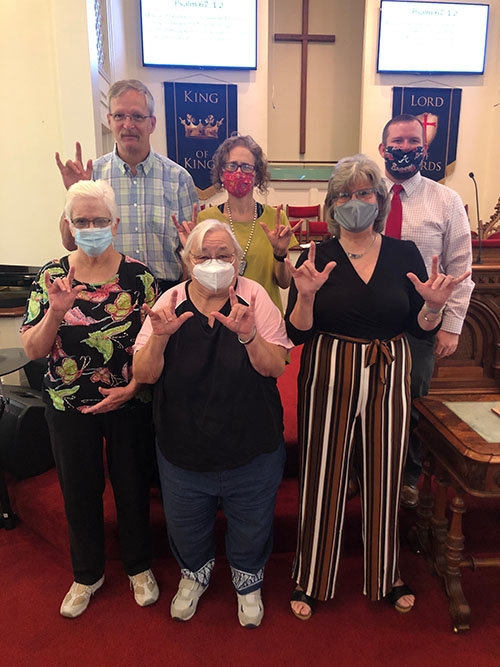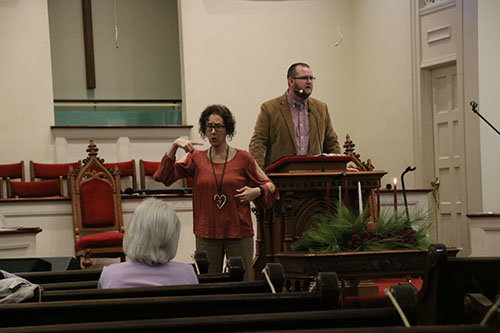Congregants gather for worship at Cave Spring FBC. SCOTT BARKLEY/Index
CAVE SPRING — The town of Cave Spring can appear to be more active than its population of a little over 1,000 suggests. Tourists flock to the antique stores dotting the picturesque town square. They can also get a snack at Martha Jane’s Fudge Shop, a sip of java at Spring Brew Coffee Company, or some of the best ‘cue in the state at Local Joe’s restaurant. Linda Marie’s Steakhouse on the Square has built up a sterling reputation in the region.
Rolater Park is a popular gathering place for family reunions of those in northwest Georgia and northeast Alabama. For $1, guests can walk inside the limestone cave (a constant 57 degrees on hot summer days) and get bottled water from the spring that inspired the town’s name. That spring flows directly into Rolater Lake, the second-largest pool in Georgia at 1 ½ acres, that understandably has some of the coldest water you’ll ever take a dip in.
First Baptist Church sits directly across Cave Springs Road from Rolater Park. Founded on Sept. 24, 1836, its footprint leaves a deep imprint in the community’s history. Like many churches, though, the years left it in a state of needed revitalization. And while 2020 has challenged it like other congregations, this can also be the year that marks a change for the better.
“I’m grateful First Baptist realized it needed to go in a new direction,” said 32-year-old Jarrod Kinsey, who became the church’s pastor in late June. “Their community had changed. It wasn’t the same as it was 40 years ago and there was a desire for revitalization.”

That realization came after church leaders met with a consultant. The key takeaway from that meeting was the need to hire a full-time pastor. Over the previous 15 years, First Baptist had called seven bivocational or interim pastors, so a longstanding footprint in the pulpit had eluded the congregation.
Several of those pastors were from Shorter University. Kinsey, also a Shorter graduate, would ultimately become the church’s first full-time pastor in a decade and a half.
Prior to arriving in Cave Spring, Kinsey was an associate to the pastor of the North Georgia campus in Rossville under Brainerd Baptist Church in Chattanooga. Before that he and his wife, Cheree, had served as missionaries in the Philippines with their two older children, Harper and Hudson, at the time four and two years old. A year after returning to the U.S. they adopted twin baby girls through foster care, Evie and Ivie.
Kinsey’s preparation for the Cave Spring pastorate began before he even knew about it.
“As the Lord would have it, I was taking a course in church revitalization through Southeastern Baptist Theological Seminary as part of my MDiv program,” he said. “I’d fallen in love with that field and felt called to it. While taking the course, the church contacted me. And now, I’m putting things into practice I learned in class.”
In an August interview, Barna Group’s David Kinnaman stated that as many as 1 in 5 churches may not survive the pandemic. In fact, that trend could get even worse.
“If anything, I think that prediction was based on data about two … two-and-a-half months ago and I think we’re even more likely to see that to be the case today,” he said. He further noted that shortly after the pandemic began, 70% of pastors felt confident their churches would reopen. Recently that number has dipped to 58%.
And while a church is to be evangelistically focused, its outreach efforts will take on even greater weight, he added.
“It’s going to really change the way people think about their donation relationship with local churches as well. There will have to be a greater demonstration of the value that a church brings not just to those who attend, but also to those who are a part of its community.”

One of the more distinctive attributes of Cave Spring is it serving as the home for the Georgia School for the Deaf. Leslie Jackson, a member of First Baptist, has been the school’s superintendent since 2011.
First Baptist’s relationship with GSD goes back to its founding. At the 1843 meeting of the Georgia Baptist Convention, held in Cave Spring, the GBC voted to take under its control the Hearn Academy, also in Cave Spring. First Baptist members were instrumental in the school’s founding and the church even met in the school’s chapel.
According to First Baptist’s historical records, in 1846 four deaf students were admitted into the Hearn school rather than be transported to Hartford, Conn., the location of the American School for the Deaf. That began a tightly woven connection between the church and GSD to this day.
For years Jackson and her family lived in Cave Spring but worked and went to church in Rome. Her new position at GSD led them to pray and discuss whether they were to join a local congregation. Ultimately the Jacksons, whose property sits adjacent to GSD, felt called to join First Baptist.
“When we came to church here, I immediately joined the interpreting team. I jumped in and rolled up my sleeves,” she said.
First Baptist had a pre-COVID weekly attendance of around 80, a number that has slipped slightly to 75, Kinsey related. Approximately 6-8 members of the Deaf community make up that group, with Jackson joining church members Kris Cauthen and Mary Jo Nickelson as some of their interpreters.
“ are very faithful in attending,” Jackson pointed out. “We interpret everything from the beginning of the service to the end. One of our adult Sunday School classes also has an interpreter.”
“Our people don’t just understand that there’s a language barrier, but that the Deaf culture is different,” said Kinsey. That’s important, he added, because it shows the church can also understand an overall cultural shift. “You work hard to minister within it, not dismiss it,” he added.
COVID has put a temporary halt to some efforts. A bus ministry on Wednesday nights brought up to 50 kids to the church, for instance. But other outreach efforts have taken shape in the last few months. Men and women have begun separate Bible study groups on Sunday night. A jumpstart to the men’s ministry came with a fellowship outing at a local lake that included fishing, eating, and music. Future plans include grocery deliveries and hot dog suppers in the summer. Since Kinsey’s arrival, younger families have joined and the church has recorded four salvations.
First Baptist Cave Spring may appear small in stature, but has a lot going on. Kinsey’s optimism reflects that perspective.
“I see us as a multi-generational church going forward that becomes sensitive to the gospel need in our community,” he said. “We’re doing whatever it takes to reach others with the Good News.”